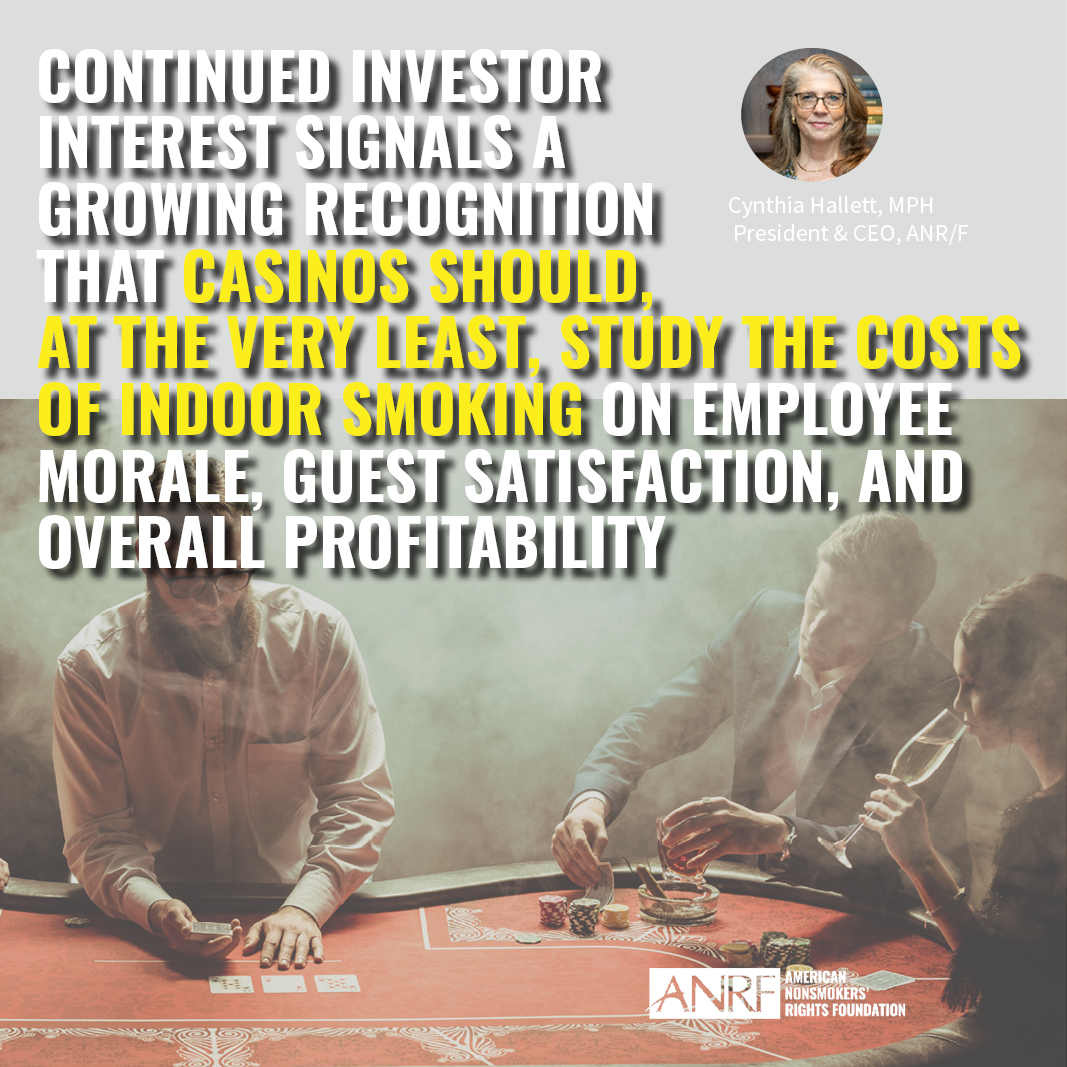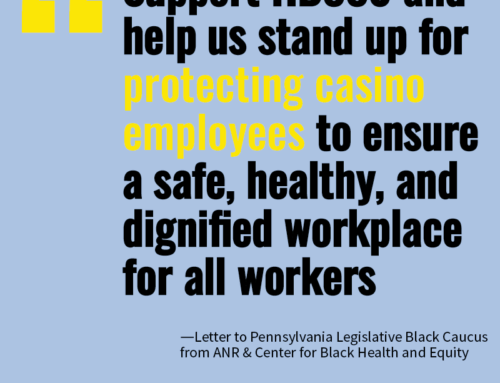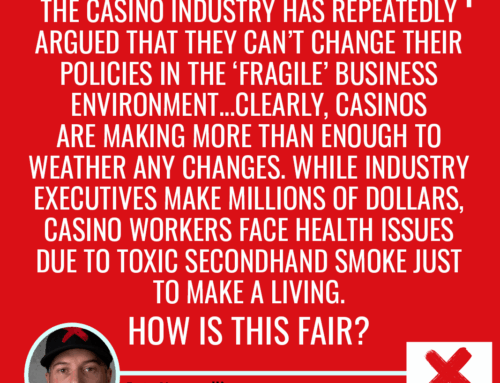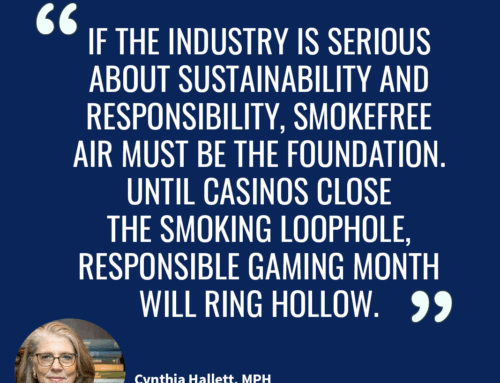Builds on Nearly 60 Million Shareholder Votes in Favor Last Year
Proposals to Wynn, Boyd, Caesars, and Penn Reflect Growing Investor Support and Continued Focus on Evaluating Business Benefits of Operating Smokefree Indoors
Berkeley, CA — Building on the grassroots demand for ending smoking inside casinos in the 14 states where casino patrons and workers are allowed to be exposed to dangerous secondhand smoke, American Nonsmokers’ Rights Foundation (ANRF) and Trinity Health have filed shareholder resolutions calling on some of the biggest names in the industry—Wynn Resorts, Boyd Gaming, Caesars Entertainment and Penn Entertainment—to study the economic benefits to implementing smokefree policies in their properties. Votes will take place beginning April 30 and continuing into May and June.
This is the second year the organizations have submitted proposals to major casino operators. The effort this year marks an expansion after nearly 60 million votes were cast in favor of the proposal to conduct the study. Wynn Resorts, Boyd Gaming, and Caesars Entertainment sought to omit the proposal from their Annual Meeting of Stockholders, however, the votes will take place after the Securities and Exchange Commission (SEC) rebuffed attempts to dismiss the proposal.
“There are clear business risks to allowing indoor smoking in casinos, including higher health insurance premiums, higher maintenance costs and a significant deterrent to potential visitors due to secondhand smoke exposure,” said Cynthia Hallett, president and CEO of the American Nonsmokers’ Rights Foundation (ANRF). “Last year’s success demonstrated that investors are increasingly interested in understanding the financial and business implications of smokefree policies. We are encouraged by the strong support we’ve received from shareholders and look forward to engaging with more companies this year. The continued investor interest signals a growing recognition that casinos should, at the very least, study the costs of indoor smoking on employee morale, guest satisfaction, and overall profitability.”
In 2024, similar proposals filed with Bally’s Corporation, Boyd Gaming, and Caesars Entertainment garnered just shy of 60 million shareholder proxy votes in favor. Notably, the proposal to Bally’s Corporation received backing from a broad spectrum of shareholders, including Rhode Island State Treasurer James Diossa, who voted in favor of the proposal on behalf of the state. This level of investor support is remarkable for first-year proposals, and was considered by asset managers to be a strong signal from investors for the companies to consider the business risks of indoor smoking.
Casinos are more than just places for gambling; they are hospitality hubs that offer restaurants, meeting spaces, and other amenities, drawing visitors who expect clean, healthy environments.
“These proposals are about due diligence. Companies study all kinds of operational risks—indoor smoking should be no different,” said Cathy Rowan, Director of Socially Responsible Investments at Trinity Health. “By evaluating the financial impact of smokefree policies, casino operators can make informed decisions that reflect long-term shareholder value. We’re not telling them what the outcome should be—we’re saying it’s time to look at the numbers.”
In the next several weeks, shareholders will vote on proposals requesting that the companies each commission and disclose a report on the potential cost savings through adoption of a smokefree policy at their properties across the United States. Shifting smoking to outdoor areas—already the standard in many states—aligns with growing public sentiment, as 88.5% of Americans are nonsmokers. This shift would benefit businesses, workers and guests alike, including the majority of workers and customers who prefer smokefree environments.
“From an investor standpoint, the request is straightforward: conduct a cost-benefit analysis and report the findings. Understanding the financial effects of smokefree policies is a matter of responsible corporate governance,” said Ann Scholz, SSND, Director for Corporate Social Responsibility, School Sisters of Notre Dame Collective Investment Fund and co-filer for the proposal to Boyd Gaming. “We believe this information is essential to evaluating whether current practices are aligned with customer trends and long-term business performance.”
In addition to filing these proposals, ANRF and Trinity Health are engaging in ongoing discussions with other major casino companies, including Churchill Downs, MGM Resorts International, and Bally’s Corporation, to encourage the companies to explore the financial and operational risks of maintaining their current smoking policies.
Background
As of 2025, 20 states, plus Puerto Rico and the U.S. Virgin Islands, mandate 100% smokefree commercial casinos. Additionally, more than 100 sovereign Tribal casinos operate smokefree indoors. The growing trend toward smokefree policies reflects not only public health priorities but also the business case for such policies.
A report by Las Vegas-based C3 Gaming found that casinos without indoor smoking outperform their smoking counterparts. “Data from multiple jurisdictions clearly indicates that banning smoking no longer causes a dramatic drop in gaming revenue. In fact, non-smoking properties appear to be performing better than their counterparts that continue to allow smoking.”
In a Gallup survey, just 11% of Americans reported having smoked a cigarette in the past week. According to the survey, “over the past three years, an average of 6% of adults under age 30 say they have smoked cigarettes in the past week, compared with 35% of young adults in 2001 through 2003 surveys.”
Ventilation systems are not the answer, according to the engineers who design such systems and collectively make up the American Society of Heating, Refrigerating and Air-Conditioning Engineers (ASHRAE). “[Ventilation systems] are not effective against secondhand smoke” and “can reduce only odor and discomfort, but cannot eliminate exposure,” reads their report.
ABOUT ANRF
Sister organization to Americans for Nonsmoker’s Rights, ANR Foundation (ANRF) is a 501c3 non-profit educational and advocacy group that has been working for over 40 years to protect everyone’s right to breathe nontoxic air in workplaces and public places, from offices and airplanes to restaurants, bars, and casinos. ANRF has continuously shined a light on the tobacco industry’s interference with sound and life-saving public health measures and successfully protected 61% of the population with local or statewide smokefree workplace, restaurant, and bar laws. ANRF aims to close gaps in smokefree protections for workers in all workplaces, including bars, music venues, casinos, and hotels. For more information, please visit https://no-smoke.org/. ANRF projects include https://smokefreecasinos.org/ and https://smokefreemusiccities.org/.






